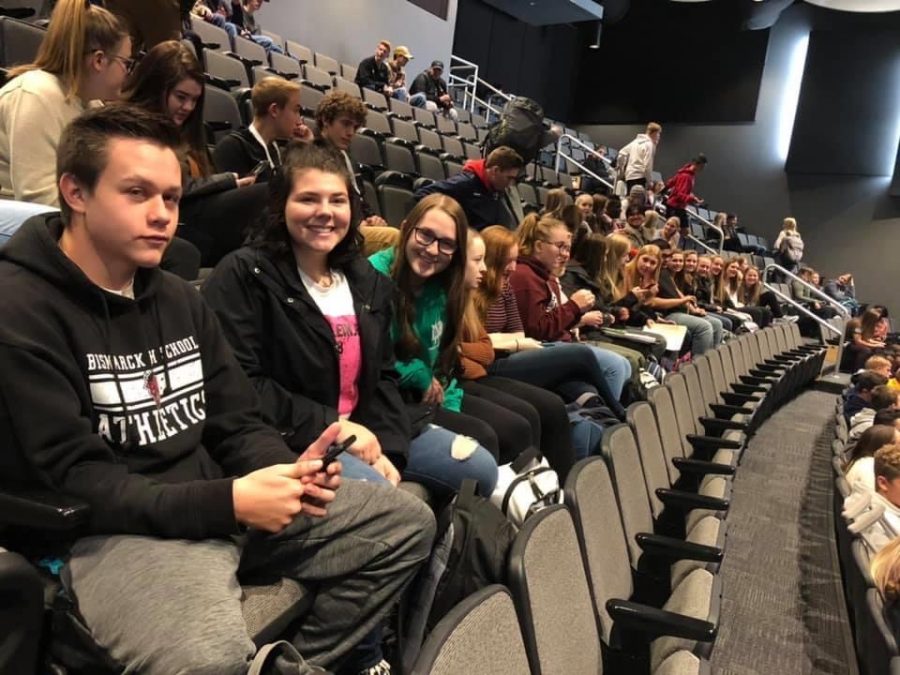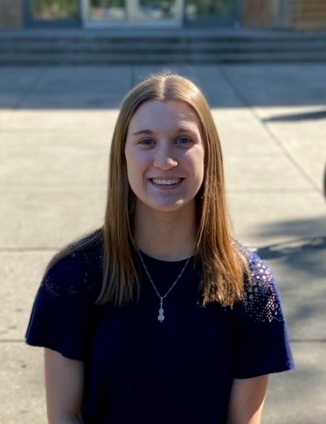Adapting to virtual form
At a time when medical systems around the world are combatting a pandemic, the world’s aspiring medical professionals are making connections and developing their skills at virtual conferences.
Modified opportunities. BHS HOSA students waited eagerly to meet U.S. Surgeon General Dr. Jerome Adams at Legacy High School last October, months before nation-wide restrictions were imposed on large gatherings. Due to these restrictions, this year’s state HOSA conference was held virtually in April, and HOSA’s much larger International Leadership Conference is set to take place this June in an online format. “The students miss out on the experience of being at a competition with over twelve thousand other students,” BHS HOSA Adviser Heather Frey said. “They miss out on all of the excitement and energy at the conference. They also miss out on all of the fun that traveling brings.”
May 22, 2020
As medical professionals tackle the coronavirus as the world’s first line of defense, a group of BHS students is training to possibly step into the shoes of these professionals one day.
HOSA is an international student organization that aims to encourage students to pursue medical careers. Like many clubs and organizations across the country, HOSA’s annual state and international conferences could not take place in-person this year due to health concerns. Instead of entirely canceling these events, however, HOSA opted to hold them virtually, which presents both benefits and challenges for the approximately twelve thousand students who attend each international conference.
“I think that the International Conference is an amazing way to make new friends and connections,” BHS junior Jamie Haug said. “Sadly, a virtual conference cannot give you that, but being able to virtually attend seminars and compete internationally is still beneficial.”
This past April, 26 BHS students participated in the virtual North Dakota state HOSA competition, of whom nine earned medals that qualify them for the virtual international competition from June 24-27. Some of these students cannot attend due to other summer plans, but those who do will be the first students to ever participate in an online international HOSA conference. Whether this change is positive or negative differs for each student and adviser.
“I am just sad that I worked so hard to be able to experience going on a trip with my friends and being able to experience a national competition, and now I don’t get a chance to do any of that,” BHS junior Kristen Vranicar said.
Many students, such as Vranicar and BHS junior Ashley Goetfried, joined HOSA this year in the hopes of expanding their skills and connecting with peers at conferences. Little did they know that their first conference would have a few significant differences from those in years past.
“I only joined halfway into the school year,” Goetzfried said. “I have never actually attended a real-life competition, but I did take part in the virtual one.”
However, HOSA involves more than simply competitions. Students gain valuable career experience, volunteer hours and even exclusive scholarships regardless of whether they take medals at state and international competitions.
“HOSA gives students many opportunities for internships and jobs that can give us references and connections for our future careers,” Haug said.
In addition to connections in the medical field, HOSA also provides students with the opportunity to earn volunteer hours, which can count towards scholarships, by holding fundraisers, drives and more. Through HOSA, members also have the chance to connect with peers who also plan to go into medicine. Friendships and the opportunity to meet students with similar interests are common reasons some students initially get involved in the international organization.
“I joined HOSA because I had Frey as a teacher sophomore year,” Goetzfried said. “She made the club seem fun, and I had friends join it, so I decided to also.”
HOSA serves a greater purpose beyond encouraging friendships, however. The organization’s mission is to improve healthcare for all and educate the next generation of medical professionals to deliver this care. HOSA’s website claims that it will still offer workshops led by medical professionals at the virtual conference, just as it has in years past, but the typically hands-on aspects of these activities will have to be modified for a virtual audience – possibly sacrificing part of the learning experience.
“At the national conferences, there are always educational symposiums and activities in between the competition times,” BHS HOSA Adviser Heather Frey said. “I know that they have speakers scheduled, but it won’t be as interactive.”
One of the activities planned for the state conference was a cadaver lab, but it was canceled when the conference moved online.
“During state, we would’ve been able to watch a cadaver dissection. I don’t know of many other places that would give high schoolers the opportunity to learn in such an advanced way,” Haug said.
Additionally, the connections students make within their HOSA chapter and with other members across the globe at the international conference are sacrificed when the event is held virtually.
“We do not get the memories of going on a trip with your friends and experiencing all that Texas has to offer,” Vranicar said. “Now, instead of being able to make all sorts of new friends and have the time of our lives, we get to go to our living room and submit our work.”
HOSA also held an in-person conference at the Bismarck Heritage Center this fall, which involved educational experiences that will no longer be possible at a virtual conference – at least without significant modifications.
“During the fall leadership conference, we had various speakers and activities,” Haug said. “I listened to a man speaking about the blind students he worked with and simple ways we can help the visually impaired around us. After his speech, he had us partner up, and we did different things, like pouring water and walking up and down the stairs with a partner and goggles.”
Despite these drawbacks, there are some advantages to holding the international conference virtually. Students can now participate from the comfort and convenience of their home, eliminating the cost of a trip to Houston, Texas, where the conference was originally scheduled to take place.
“The competition will be very affordable this year because we don’t have the added cost of travel,” Frey said.
Another potential benefit of an online conference is that certain events that would normally take place in front of a judge, such as those that require demonstrating skills or speaking, can now be recorded instead of performed live, which may be less stressful for students. At the virtual state conference, Vranicar placed second in Researched Persuasive Writing and Speaking by pre-recording her speech. Even though she was not presenting to a live audience at this year’s state conference, she hopes that participating in this HOSA event will give her practice for presentations beyond high school.
“I like speaking in front of groups of people, and the topics are always interesting to learn more about,” Vranicar said. “I can see myself using this in the future because it will help me with my presentation skills and become more professional when speaking.”
Besides these skill-based events, HOSA competitions also involve knowledge-based events in which students take tests to measure their knowledge. As with any at-home test, cheating is a concern at the international conference. HOSA has not yet disclosed what measures they will take to prevent cheating – possibly in order to preserve the effectiveness of these measures.
“Normally, students have to check into a room with several proctors to take their tests,” Frey said. “They aren’t allowed phones or to talk to anyone else.”
Regardless of whether future conferences are held in-person or online, the BHS HOSA chapter will continue to serve its community in the hopeful aftermath of the coronavirus pandemic. For now, Frey hopes that her students grow their medical and leadership skills through HOSA.
“HOSA has been a huge organization at BHS,” Frey said. “I hope that it continues to help enhance the student experience at our school and especially help those who are interested in pursuing a medical career.”


